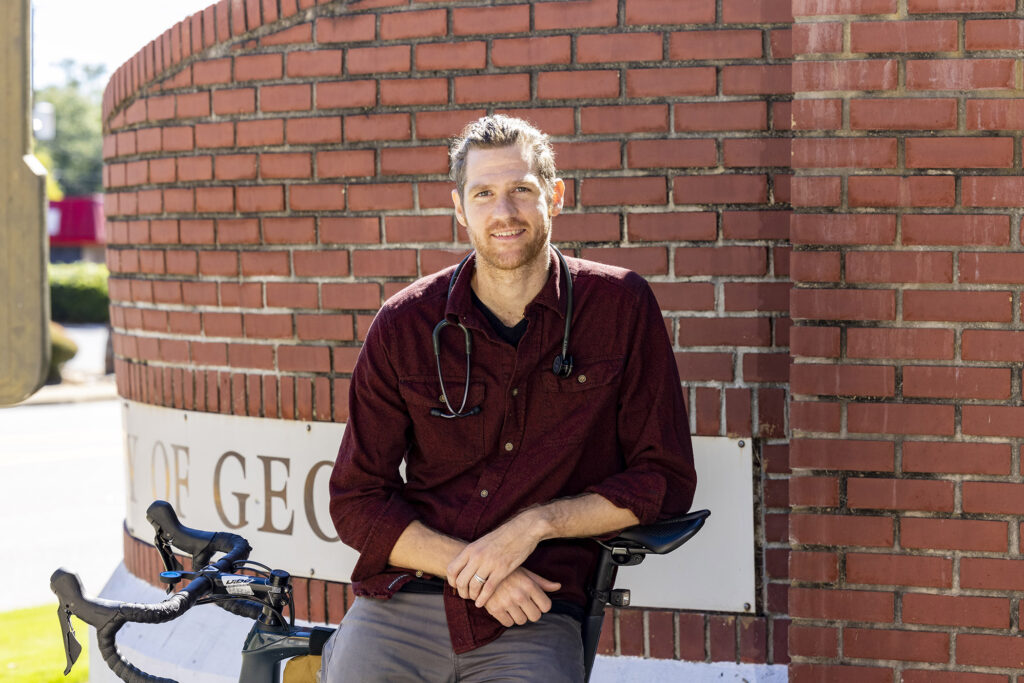Dr. Brett Magner is on a mission not only to break down health care barriers in Athens-Clarke County, but also to train future doctors through a people-centered approach to medicine.
Magner, an assistant professor with the Augusta University/University of Georgia Medical Partnership, advises medical students to be approachable by being human.
“If you’re able to meet patients where they’re at and have meaningful conversations with them, that can have a huge impact on their lives,” he said.
Magner is a 2015 graduate from the AU/UGA Medical Partnership and specializes in family medicine in underserved areas. Family medicine addresses comprehensive healthcare for all ages and genders, and physicians in this field are often primary care doctors. Typical for his specialty, Magner wears many hats.
Taking care of diverse populations
Magner co-teaches first- and second-year medical partnership students alongside Dr. Suzanne Lester, an associate professor of family medicine and medical director of the Athens Free Mobile Clinic, and Dr. Farris Johnson, a native Athenian and family medicine physician.
“Dr. Magner’s return to the partnership has been a reinfusion of the life energy which was given him as a student here,” said Johnson. “His caring, nurturing spirit, coupled with academic excellence, have been vital in the Community Health and Free Clinic initiative. The Athens/Northeast Georgia communities have benefited greatly by his engagement, and [he] will continue to improve the lives of those served as well as those educated here.”
In their community population health course, students in the class learn basic clinical skills, but they also learn about health disparities and the practical implications of those disparities on patients’ lives.
Dr. Brett Magner (center) introduces first-year medical students to the facilities at Advantage — The Pavilion for Behavioral Health where they will be providing low-cost medical care to local Athenians. (Photo by Dorothy Kozlowski/UGA)
“In Athens, there’s a large population of underinsured and uninsured patients,” Magner said. “So just getting in to see your primary care physician can be tough for a lot of people. And even if they are able to get in, they may not be able to pay for the appropriate labs or medications or imaging they need.”
To give students experience addressing those needs, the class partners with the Athens Free Mobile Clinic as well as several local organizations including Advantage Behavioral Health, Nuçi’s Space and the Clarke County School District, among others.
These collaborative projects amplify the work of local organizations while also giving medical students firsthand experience building community relationships and assisting Athenians who otherwise may not be able to receive the medical care they need.
“If we get a call about a patient who needs care but can’t go to the ER, or someone who needs to be seen in an outpatient setting, we try to make that happen,” Magner said.
Listening to patients
When he’s not working with students, Magner makes time to respond to local patients through the mobile clinic. Sponsored by the medical partnership, the clinic offers a range of free and low-cost services to Clarke County residents, from COVID-19 vaccinations to specialty-care referrals.
In a recent call, Magner visited a patient who needed care at an HIV outreach partner site.
“I met with them and was able to get a full history and get them set up with the appropriate referral. That’s the beauty of the mobile clinic,” he said. “We schedule vaccine clinics, but we also fit in primary care.”
Since its inception in 2018, the mobile clinic has provided nearly $140,000 in medical care to more than 600 Athens community members. To date, the clinic also has administered 3,754 COVID-19 vaccines and 3,500 COVID-19 tests to Athenians in underserved communities.
“It’s nice to work with the mobile clinic because I have the time to sit down with a patient, listen to their story, help them find the resources to do what they need, and I don’t have to worry about them feeling like they can’t pay for something,” said Magner.
Whether through the clinic or other partner organizations, students and faculty within the AU/UGA Medical Partnership are building bridges within the Athens community. And for Magner, that’s one of the most essential parts of being a healthcare practitioner.
“I always tell my students, you’re going to able to learn the medicine, but if you can understand the patient and hear where they’re coming from, you’re over halfway there in taking care of them.”
